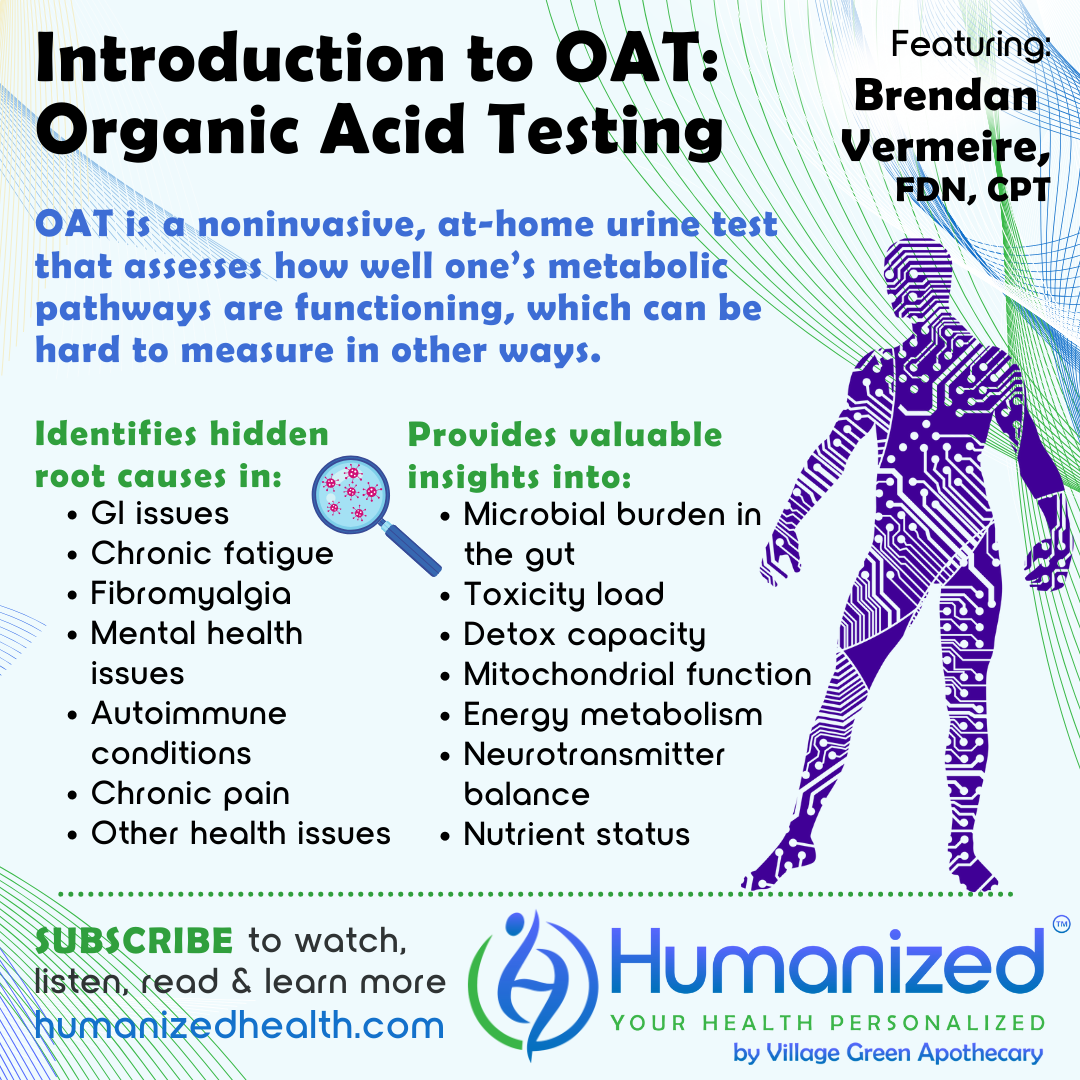Introduction to OAT: Organic Acid Testing
Featuring
Brendan Vermeire, FDN, CPT
WATCH
LISTEN
READ
Rebekah Kelley: Welcome to the Humanized podcast, all about personalizing your health. I’m your host, Rebekah Kelley. And today I’m so excited to have Brendan Vermeire here. Today’s subject is OAT – organic acid testing. And I can’t wait to hear more about this. But before I introduce Brendan, I want to remind everyone to subscribe, to get all of our variety of casts and audio, video and transcription at HumanizedHealth.com. And I’d also like to thank our lead sponsor Village Green Apothecary, at MyVillageGreen.com.
Before we get started and talk to Brendan, we also want to find out a little bit more about him. He’s a functional medicine consultant, clinical researcher, board certified holistic health practitioner, master nutrition coach – long list, I’m going to keep on going – master personal trainer, USAW Sports Performance Coach, and CrossFit Certified Trainer. Lots of education there. Brendan is regarded as one of the top leading experts in metabolic health and holistic education. He is a proud owner of the Metabolic Solutions Institute, dedicated to educating health professionals and clinicians with cutting edge strategies to best serve their clients and patients.
Thank you so much for being here, Brendan.
Brendan Vermeire: Well, thank you for having me, Rebekah. I love getting to have these conversations and you know, it’s a little bit cut off here [gesturing to words on the wall behind him], but it says the greatest medicine of all is teaching people not to need it. And I, I really live by that because I really believe that we have to educate and empower our clients, our patients, our friends, our family, the world, to really evoke more of a self-healing movement, where people are empowered to advocate for themselves and transcend their greatest health struggles. So I think this is where a lot of the magic and healing happens, and I really appreciate the opportunity.
Rebekah Kelley: So excited. Thank you so much. Well, most people have never heard of the organic acid test, or OAT test. So I just want to launch right into it. What can it tell us that typical medicine tests don’t?
Brendan Vermeire: Absolutely. So lab testing is a subject near and dear to my heart. I really have built my whole career around lab testing. It started back when I was a personal trainer and nutritionist, where at that point in my career, I was primarily working with clients that were suffering from a lot of what I call the “Standard American Metabolism,” so good old uncle SAM. And that really is composed of a lot of the typical metabolic dysfunction, such as insulin resistance and type 2 diabetes, non-alcoholic fatty liver disease – usually like a subclinical hypothyroid, kind of a sluggish thyroid – HPA axis, dysfunction, leaky gut, a dysbiotic microbiome. The list goes on and on and on, and it is a very standard American metabolic sort of milieu, this chronic metabolic dysfunction that creates this low grade meta inflammation that people are kind of quite literally cooking in their bodies long-term, and that’s really where we see the rise of all of these chronic conditions and co-morbidities.
And so with lab testing, a lot of the clients I was working with at the time, early in my career, [I would ask] what’s your goal, why are you here? Well, I want to lose weight. Okay – do you also want to feel better? Well, sure, I think I’ll feel better when I lose weight. Okay, cool. And you dig for their “why” and, well, how do YOU want to measure progress along this journey? Well, you know, the scale, I want to lose 30 pounds in the next 3 to 6 months.
So you have to reverse engineer that. And this is where, even as a young and new professional, I knew the toxic psychology that that scale, and just pure body weight really induces. And it can very quickly dismantle all the behavior modification that the client is so tenaciously trying to integrate into their life. And so from day one, I was like, no, we’re not using the scale to measure progress. We’re going to measure your body fat using a $10,000 body fat scanner. We’re going to use VO2 testing to measure your respiratory quotient, your gas exchange for cardiac output and basal metabolic rate. And we’re going to use lab testing.
And so it really started with good old-fashioned blood work, blood chemistry, no different than you might go do through your conventional health care provider for just general health monitoring. So it was during that time, I started getting exposed to some of these other, more kind of exotic lab tests, whether it was a salivary cortisol DHA profile, food sensitivity testing… and that launched me into this whole world of functional lab testing, which I dove head first in. I climbed to the top of that industry. I’ve trained hundreds, and many, many practitioners, doctors – and with functional lab testing, it’s an exploding market. There’s a test for everything.
Now, I think it’s really important, before we get into organic acids, to understand that a lot of these functional lab tests, they really don’t have a lot of clinical significance established behind it. A lot of them are experimental tests. A lot of them don’t actually have established efficacy. And of course, you know, if these tests were really that great or that clinically effective, why are they not being used in mainstream conventional health care? Is it that it’s the best new thing and it just hasn’t integrated or gotten adopted into conventional healthcare? Or is it because, hey, it doesn’t have clinical significance, so why would we use it as a clinical tool?
So I say that to sort of illustrate why I love organic acids so much, because out of all the functional tests, I think it really stands out, as it has probably the most science behind it. Out of everything outside of blood testing, it has much more established science, clinical significance, and it can really elucidate some of these underlying metabolic, hidden stressors that can contribute to the metabolic dysfunction that we experience as our symptoms, our health complaints, and maybe even different diagnostic labels that we’ve been given and diagnosed with.
So with organic acid testing, it originally was a technology used in conventional health care. And the original purpose was to detect for, basically, inborn errors and these genetic mutations that could cause severe life-shortening diseases in young people, such as maple syrup urine disease. It’s kind of one of the main ones, and it has a funny name, but it’s actually a very horrible genetic disease that causes mortality, usually before the age of 3. So that was the original purpose. But once we started realizing, well, hey we can measure these organic acids, these metabolic metabolites in the urine, and, what else can we measure? So that original technology has been expanded upon by a lot of different scientists around the world. And this has given rise to these “functional” organic acid profiles that are more elaborate, more sensitive and looking at other metabolic characteristics that reflect a dysfunctional biochemistry and dysfunctional metabolic systems.
So depending on… there are multiple organic acid tests on the market, multiple laboratories have their own unique tests. So the markers are slightly different from panel to panel, but they do have more in common than anything. And the way that I describe the organic acid test is typically as a microbial burden and a toxicity load type of assay. So where your conventional blood chemistry is more an accurate reflection of your physiology, how are your organs working, how is your glucose regulation, what are your lipids doing – to make sure that there’s no tissues, no organs that are dysfunctional – organic acid testing is a very sensitive way that we can look at things such as bacterial or fungal overgrowth within the GI tract, which is actually a really hard thing to test for. These days there’s a huge sort of obsession with stool testing and using this experimental PCR technology, which really hasn’t been strongly validated yet. But a lot of these different bacterial or fungal pathogens, potentially, or commensal microbes that live in our microbiome, well, they produce and release a lot of these metabolites, that then we can measure the quantity of those metabolites in the urine. And so this actually gives us a lot of insight into does this client or patient have some sort of, basically, “microbe or bug” overgrowth that might be contributing to their health dysfunction.
So that’s probably one of the most valuable aspects of the organic acid test, but there are a lot of things that we can measure in the urine and we really can’t get that information elsewhere, such as our neuro-transmitters. So when it comes to our brain hormones and brain chemicals, those neurotransmitters… you can’t measure what’s going on in the central nervous system. The best thing that we have is looking at the breakdown products of these neurotransmitters that we can measure in the urine through organic acid testing. So we look at actually mitochondrial function, detox capacity, glycolytic capabilities of how we’re regulating and converting blood sugar, ketone and fatty acid oxidation – so how well can this person utilize fat as a fuel source – as well as different types of genetic markers and other more lucrative things like oxalate metabolism.
So this is why, to more simplistically describe it, I really say microbial burden and toxic load. And when you look at a lot of the common characteristics of some of these different pathophysiologies, whether it’s IBS and IBD, gastrointestinal issues, mental health disorders, depression, anxiety, neurodegeneration, or even in something like autoimmune or chronic fatigue or fibromyalgia, the OAT test really does identify some of those hidden root causes that we can’t really effectively measure on anything else.
So it is a test that I’ve used abundantly in my practice. I’ve created courses around it and train doctors around the country and the world on how to implement the organic acid test into their practice. And so where I really recommend people consider it is any type of gut-brain access disorder. So anybody that has GI issues, whether that’s mild IBS or just bloating or diarrhea, constipation, so on and so forth, in any sort of mental health – so gut issues, mental health issues, chronic pain, chronic fatigue, fibromyalgia, autoimmunity. If somebody resonates with those demographics, I absolutely recommend running organic acids test. It’s an inexpensive, at-home, non-invasive urine test that could potentially “identify” some root cause contributing factors that, when addressed effectively, could very much change the life of that individual and change the course of their health and their disease states and their diagnostic labels, and really empower them to overcome that and re-achieve vital vibrant health again. So I think it’s a very valuable assay.
Rebekah Kelley: Wow, Brendan, that’s pretty amazing. Could certainly argue for adding that to our list of things for whenever we get reviewed for our health. Thanks Brendan, those are really valuable insights. Brendan Vermeire can be found at www.MetabolicSolutionsLLC.com.
And let me remind you to subscribe and get access to all Humanized videos, podcasts and transcriptions from all of our thought leaders on personalized health at HumanizedHealth.com.







